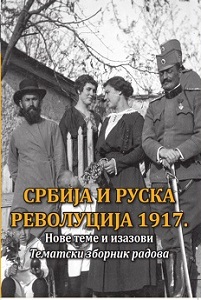Велики и мали. Деловање Хрватске странке права у Руској царевини до Октобарске револуције
The Great and the Small. Activities of the Croatian Party of Rights in the Russian Empire until the October Revolution
Author(s): Goran Miloradović
Subject(s): History of ideas, Political history, Nationalism Studies, Between Berlin Congress and WW I, Inter-Ethnic Relations, Peace and Conflict Studies
Published by: Institut za noviju istoriju Srbije
Keywords: Krunoslav Heruc; Croatian Party of Rights; Slavophilia; Yugoslavism; nationalism; Russia; Serbia; Croatia;
Summary/Abstract: The article deals with the activities of the members of the Croatian Party of Rights in Russia from mid-19th century till the 1917 October Revolution. Conflict between the Serbian and Croatian program for formation of nation states was related to the aspirations of the Russian and Austrian empire to take part in the division of the Ottoman heritage in the Balkans. In such context, representatives of the Party of Rights sought to create a political base in Russia for the realization of the main goal of their program: the creation of the Croatian state in the maximum extent – within or outside the Habsburg monarchy. There was a consensus on the basic elements of Croatian national interests between the National Party of J. J. Strossmayer and the Party of Rights of A. Starčević, who cooperated. After E. Kvaternik’s failure to find support in Russia for the program of the Party of Rights, Krunoslav Heruc, very capable advocate and organizer and also a member of the Party of Rights, went to St. Petersburg. In the period from 1885 to 1917, he used the Slavophil ideology to form a number of interconnected associations which influenced various Russian institutions. He wrote for a number of newspapers and magazines in Croatia and Russia, and published a number of publications promoting the ideology of A. Starčević. During the World War I, he joined a group of associates of different nationalities with whom he fought against the policy of the Serbian government and interfered with the formation of volunteer corps in Russia. The success of his actions was partly due to distress in Serbian institutions and demoralization of the Serbian elite after the military defeat and occupation of Serbia in 1915, as well as the lack of understanding of official Russian circles of international relations in the Balkans. Struggle between the Serbian and Croatian politics in Russia was ended with the revolutions in 1917 that have paralyzed the Russian institutions, and then launched a civil war. In such circumstances, the orientation of the Yugoslav program was the only way out for the two opposing sides.
Book: Србија и руска револуција 1917. Нове теме и изазови
- Page Range: 315-348
- Page Count: 34
- Publication Year: 2017
- Language: Serbian
- Content File-PDF

